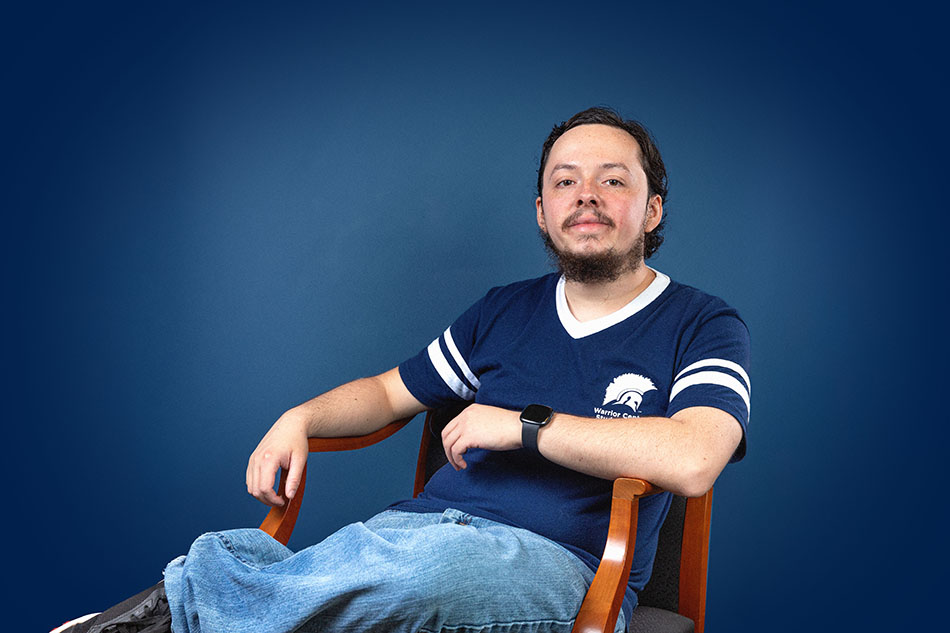
Mark Ventura Henry vividly recalls the silence following the crack of the plastic phone stand striking his skin. But it wasn’t the sound of impact that lingered — it was the hush afterward.
“[I was beaten] with a phone stand until it drew blood. For me, it felt more like glass shattering,” he says.
That moment splintered the thin veneer of a seemingly ordinary childhood and crystalized a lasting truth for Mark.
“Everyone has trauma. Only you decide how the things you go through affect you.”
For Henry, however, he did not let trauma break him. Instead, it fueled his passion and desire to succeed — to prove that dealing with trauma productively can be used as a building block for the future. For Henry, that future is a career in computer science once he completes his degree at Texas A&M–University Central Texas.
Growing up in Killeen, Henry’s early days were predictable: mornings spent at St. Joseph’s Catholic Academy and afternoons roaming streets warmed by cedar and hot asphalt. Yet beneath this surface of normalcy, tensions simmered at home, exacerbated by his father’s perpetual absence as a military contractor and the forgotten promises that “the next time he’s back, he’ll be back for good.”
His father’s absence cast long shadows, leaving his mother alone to bear emotional and practical burdens, particularly caring for an alcoholic uncle whose erratic behavior dominated her attention and energy. This stress frequently erupted into volatile outbursts aimed squarely at Mark and his siblings.
“My mom would spend a good chunk of her time trying to take care of him… she took a lot out on my siblings and me through screaming and blaming,” he explained.
In this volatile environment, Mark learned to anticipate conflict rather than comfort. Persistent hoarding forced a performative normalcy he found exhausting.
“It was always kind of soul-crushing to have to ‘clean’ to have people over for birthdays by just moving all sorts of crap into other rooms until they leave and we have to put it all back,” he said.
Over time, he resigned.
“I always knew better than to believe things were going to change one day.”
Such conditions cultivated his emotional detachment.
“I got accustomed to the feeling of being surrounded by people I don’t talk to,” he admits.
It was a survival strategy born from necessity, but one that isolated him deeply.
The family dysfunction, though, was not isolated to his immediate household. Generational trauma was palpable. His paternal grandmother’s early death was a consequence of severe abuse by her father and his paternal grandfather struggled with mental instability.
“He literally sent us letters about wanting to take over the world with the help of the president and the secret lizard people,” Mark notes.
These inherited traumas echoed loudly into his adolescence, manifesting as depression and anxiety. By middle school, dread became his familiar companion, his inner turmoil mistaken for politeness by teachers who praised his excessive apologies.
However, fear eventually bored him. Driven by an instinctual resilience, he deliberately placed himself in uncomfortable situations to confront his shortcomings head-on. His exploration led him to Warrior Influencer Network (WIN), a student media collective at A&M–Central Texas focused on social media storytelling and podcasting, where he began cultivating confidence.
Nonetheless, his greatest guides came from the digital world. Home alone with a cracked iPad, he discovered mentors on Youtube like Dan Koe, Mark Manson, Cal Newport, HealthyGamerGG, Alex Hormozi, and the Koi brothers.
“Real self-development YouTubers have helped me more than anyone,” he insists.
Inspired, he dove into self-education, devouring books like Victor Frankl’s “Man’s Search for Meaning” and Maxwell Maltz’s “Psycho-Cybernetics.”
Mark distilled his learning into a personal philosophy: radical responsibility, intentional focus, disciplined action, and pushing through discomfort.
“Not everything is your fault, but it is always your responsibility to choose how to respond,” he asserts. “Inaction is a choice too.”
These principles guided him during his junior year in high school, when trapped between desperation and determination, he chose life and purpose over despair.
“One day I really did just get to the point where I felt I had two choices: do or die,” Mark recalls.
Academic ambition soon became a channel for his burgeoning resolve. Enrolling in Early College High School, he split his time between Fort Hood and Central Texas College, earning his Associates of General Studies early. Leveraging the Texas Hazlewood Act — his parents both having served in the military — he continued his education at Texas A&M University-Central Texas, opting for computer science.
His university routine became mornings steeped in complex algorithms, midday kickboxing sessions to relieve stress, and meticulous review of digital flashcards throughout the day. But discipline had its darker side.
“I have a habit of latching onto a lot of goals. Ironically, failing to perform well felt more correct than succeeding,” he said.
This cycle — ambitious overload, inevitable burnout, necessary recalibration — taught him the value of sustainable pacing. He began embracing the importance of occasional “bare-minimum days” to maintain momentum.
Today, Mark charts a clear path ahead, aiming initially to become a data analyst and eventually a machine-learning engineer specializing in computer vision.
“I don’t plan on dying anytime soon, so I should ideally have a long life ahead of me,” he jokes.
Advanced mathematics, fitness, and artistic pursuits remain part of his expansive vision.
Despite the haunting complexity of his upbringing, Henry harbors no hatred.
“When you feel like something is impossible, that’s just what hard feels like. Things can be hard, and you just do them anyway,” he said. “If you look at my circumstances from an extremely negative light, you could say I was born to break, and for a while, I did. But belief comes because you know you are someone who can accomplish more, even when that voice in your head tries to convince you otherwise.”
